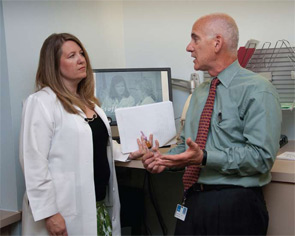Editor’s Note: This is the second in a two-part series about rheumatology health professionals who can help ease the time crunch for busy practices. Part One, about physician assistants, appeared in the June issue, p. 45.
“I am hard-pressed to sit down with a patient and not take extra time to explain a diagnosis or medication,” says Debra Bancroft Rizzo, MSN, FNP-C. Rizzo, who’s been an NP with the Rheumatic Disease Center in Glendale, Wis., for more than 15 years, is voicing one way her practice can enhance the total patient care experience.1 But educating patients about disease management is only one facet of what nurse practitioners (NPs) bring to the rheumatology practice, she notes. “We increase value by bringing in direct revenue as well as increasing patient satisfaction.”
In academic and community practices, as well as Veterans Affairs–run clinics, NPs manage research studies, see new and returning patients, perform joint aspirations and injections, prescribe and monitor medications, and interface with other members of the multidisciplinary team. Rizzo’s primary role has been to evaluate and treat patients, but she has also overseen the infusion department and helped with clinical trials. She is one of five NPs who recently discussed their evolving roles with their physician partners with The Rheumatologist.
Rheumatology NPs have had a role in rheumatology settings since 1976, when Sharon Clark began participating in rheumatology clinical trials at Oregon Health Sciences University.2 Increasingly, certain rheumatology health professionals—NPs and physician assistants (PAs)—are being used to help fill the gap between demand for and supply of rheumatologists. A recent survey on Utilization of Nurse Practitioners and Physician Assistants in Pediatric Rheumatology conducted by Karen L. Kerr, MSN, NP, CPNP, PNP-BC, a pediatric NP with the Division of Rheumatology at Children’s Hospital of Michigan in Detroit; and Andrew Lasky, MD, and NP Kathy Mahoney, RN, APRN, from the Division of Pediatric Rheumatology at Children’s Mercy Hospital in Kansas City, Mo., found that pediatric rheumatologists who used NPs or PAs in their practices found it to be a positive experience.3 The majority would recommend this model to other rheumatologists.
High Expertise

Karen Huisinga, MN, ARNP, FNP, first started working at the Seattle division of the VA Puget Sound 27 years ago. Her NP supervisor had worked in rheumatology for 20 years, and when she moved to another position, Huisinga stepped into her spot. “I have a brother with psoriatic arthritis, so I already had a high interest in rheumatology,” she explains.

